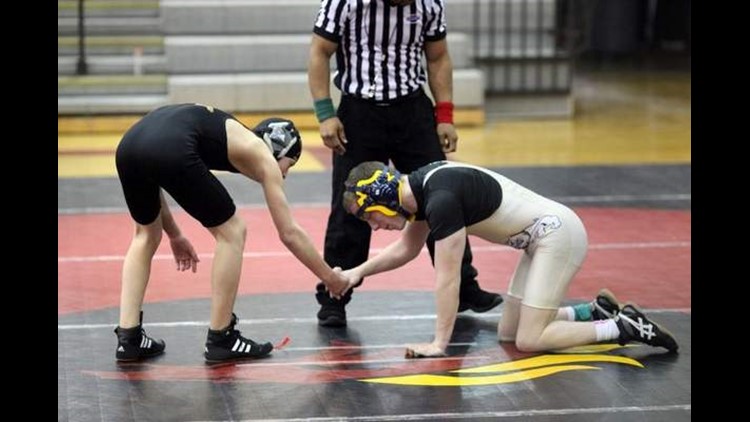![Burton [ID=5367339]](http://moc-assets-prod.gannett-cdn.com/-mm-/4044b1e7645488621f157de466cf1a990870caa2/r=500x333/local/-/media/WMAZ/WMAZ/2014/02/10/1392058193000-Burton.jpg)
It's early on a Saturday, and Fairdale (Ky.) High School senior Willie Burton is preparing for his first wrestling match of the day. He claps and howls for his teammates until it is his turn, and then it becomes more complicated.
One Fairdale wrestler pulls Willie's singlet straps over his shoulders. Another attaches his headgear. Then two others reach under Willie's arms, lift him from his wheelchair and gently place him on the mat. Willie quickly crawls to the circle, his lower legs dragging more than pushing.
Willie has a severe case of cerebral palsy, a nervous system disorder that affects movement, muscle tone and motor skills. He cannot walk and has limited use of his right arm. His head sometimes sways, and he often stutters. But none of that has stopped him from doing what seems, on the surface, almost impossible.
"A lot of people told me there was no way I could wrestle because I can't even walk, and that made me want to do it even more," Willie says, focusing to get his words out clearly. "I'm not going to let a wheelchair or a disability hold me back."
This is Willie's fourth and final season with Fairdale. He has broad shoulders and a strong upper body, but his legs are frail. He wrestles in the 106-pound weight class, where aside from forfeits, he has never won a match.
But to measure Willie's success in wins and losses is to miss the point. The wrestling mat is where he can be free. It is where he can feel, if only for fleeting moments, that he is just like everyone else.
When Willie wrestles, he forgets about the mother who left him behind. He forgets about the surgeries. He forgets about the people who kept their distance from him because they were almost fearful.
A tattoo on Willie's left forearm reads: "What doesn't kill you makes you stronger," and he has made that his guiding principle, on the mat and off.
OUT OF THE BLUE
Larry and Brenda Burton had talked about having a child, but they had married late, and by the time Brenda turned 44 they were considering other options.
The couple attended Churchman Chapel in Louisville, and one day, a pregnant 17-year-old girl contacted the minister and asked if anyone in the church might adopt her baby.
The Burtons, despite initial reluctance, met with the girl for four hours on a Friday afternoon. She was seven-months pregnant and they could tell she was troubled. They wanted to help both her and the baby.
They figured they had two months to prepare their home for the new arrival. But the mother went into labor that night and gave birth to a baby boy about 2 a.m.
"It was almost like Willie was just waiting to hear that somebody would take him," Brenda said.
In addition to being born prematurely, tests later revealed hemorrhaging in Willie's brain. Doctors believed the mother had done drugs while pregnant, and it appeared there would be long-term effects.
Willie was ultimately diagnosed with cerebral palsy. Doctors told Brenda and Larry that their new son would never walk.
"I went into the hallway, leaned against the wall of the hospital and prayed," Brenda said.
But the couple did not waver because it knew the child needed someone's care.
Over the next five years, Willie had surgery to repair damage to his spinal cord, four procedures to help straighten and stabilize his hips, and braces put on his lower legs.
He had the final hip surgery when he was 4, and when he awoke he looked up at his adopted parents.
"Mom," he asked, "will I be able to walk now?"
Brenda held back tears and told him no, not yet, but they were doing all they could.
Willie learned to crawl when he was 5. He could move his arms and thighs, but had little use of his lower legs and could not stand. Still, he tried. At 7, aided by a walker and his parents, he slowly and proudly walked into church for the first time.
But most often, he was in a wheelchair. Elementary school classmates usually kept their distance — or even ran away when approached — because they did not understand his condition.
At home, Willie would often look out the window and watch other children playing outside.
"I could tell I wasn't like the other kids, and it got me down," Willie said. "But my mom and dad always encouraged me to just try things. So one day, I thought, instead of just wishing I was out there, I might as well just get out there. Hey, if I play a little different than the other kids, that's OK. At least I'm trying."
Willie loved sports. He would watch baseball, basketball and football, and he'd cry when the games went to commercials.
And then there was wrestling. He noticed how wrestlers sometimes went to their knees, tugging and grappling, and he thought maybe he could do that, too. As a freshman at Fairdale, he told his parents he wanted to try.
MAT TIME
Larry and Brenda were reluctant. Their son might get hurt. He might not fit in. But on the day of team sign-ups, finding the wrestling team's table unoccupied, Brenda wrote Willie's name and left a note.
"I said, 'My son is in a wheelchair. He can crawl, he can walk with a walker, and he really wants to go out for wrestling. I want you to know he is very intelligent and he really wants to do this, but the decision is yours."
Willie spoke to then-Fairdale wrestling coach Toeupu Liu, and Liu said if he passed his physical exam, he had a spot for him. Willie passed the physical, but that was the easy part.
His years of physical therapy had been more for daily function than athletic pursuits. High school wrestling was different.
When other wrestlers ran wind sprints for conditioning, Willie had to crawl up and down the mat as quickly as possible. During the first week, he was exhausted after one trip. The matches were a struggle, too, but Willie was persistent.
"I wouldn't win, and I'd say, 'OK, I'll get the next one,'" he said. "And then I wouldn't win again and again. But then I remembered that's not why I was doing this. I wanted other handicapped kids to know their wheelchairs didn't always matter."
Willie's parents had been concerned about how he'd be accepted, but that wasn't an issue. During school, his teammates help wheel him to his classes. At practice, they give him instruction. At matches, they carry him onto and off of the team bus, and when he wrestles, they are his support system.
"They're like my brothers," Willie said. "If I didn't have them, I probably would have quit a long time ago."
Junior co-captain Trey Norton said Willie's mere presence motivates all the Fairdale wrestlers.
"If he can do it, we shouldn't be complaining about any aches or pains," he said.
That bond comforted Willie's parents. They'd worried about opponents or even spectators mistreating him at matches. "And now, nobody would even think about messing with him, because they know they'd have to deal with an entire wrestling team," Larry Burton said. "Willie is off-limits."
When Willie started wrestling, opponents were sometimes hesitant because they worried they would injure him.
Chris Boyd, who is now Fairdale's head coach, said opposing coaches have asked what their wrestlers should do about facing Willie.
"And I just say, 'Uh, wrestle him,'" Boyd said with a chuckle. "He's not going to take it easy on your kid, so your kid shouldn't take it easy on him.' "
Locally, though, Willie is now well-known and well-respected in the wrestling community. At tournaments, wrestlers from other schools stop by to wish him well, and when he's on the mat, most people in the gym are pulling for him.
"I tell our kids all the time they should look at Willie in awe, for the inspiration he provides," Bullitt East assistant coach Mike O'Neill said. "He inspires us. He inspires me. I'm a military retiree, and I look at him and he's my hero."
SEEKING VICTORY
Willie's upper body is usually just as powerful as his opponent's. The struggle comes in his lower half. He simply doesn't have the strength or stability in his legs to avoid being turned over.
Last summer, Fairdale's coaches crafted a special plan for Willie. They had to find a way to get him back onto his hands and knees — where he is most dangerous — after being turned over.
In previous years, Willie used to reach out at his opponent and ended up sprawled on the mat, defenseless. With the new approach, he uncoils like a spring, ideally latching onto his opponent's leg. The strategy has been effective, and there have been times this year when a victory seemed imminent.
"When he's been close, it's been insane," Boyd said, his eyes widening. "I can't even tell you the electricity in the room when he puts a kid on his back. The whole crowd, not just our fans, everybody erupts. They see the kid in the wheelchair is getting ready to pin someone."
Despite the improvement, the results have always been the same.
But that doesn't take away from Willie's sense of accomplishment. After each loss, he looks into the stands and gives his father a thumbs-up.
"I'm not going to say I'm the best wrestler, because I'm not," Willie said. "But I've really come a long way."
Willie plans to attend the University of Louisville where his father works as a mechanic at the physical plant. He would like, one day, to become a personal trainer for children with disabilities — and already, he is having an impact.
He was recently contacted by a boy with cerebral palsy who joined his school wrestling team after hearing about Willie. Brenda Burton was contacted by the mother of a girl with muscular dystrophy who planned to join the cheerleading squad because Willie had shown her that anything is possible.
"To be that kind of inspiration just makes me not want to give up," Willie said, "because if I gave up, I'd be giving up on them, too."
l



